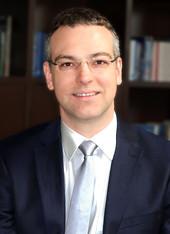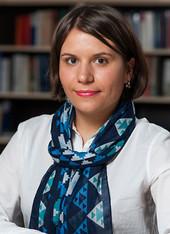First and third panel discussion focused on the issues of changing the working culture at Ukrainian state institutions and accessing the progress of corporate governance at state-owned enterprises. The main point of first panel debate was the perceived dichotomy between bureaucracy and efficiency in public administration. While some expressed concerns about bureaucracy hindering implementation of new reforms in the public sector, others argued that it is mostly a matter of distributing responsibility effectively. Ministers should be responsible for developing strategies while civil servants should provide the input on how to implement them. All agreed on the lack of financial resources within the ministry hampering the improvement of the conditions. The panel was concluded by the audience through interactive voting and the speakers answering the question whether change-making in government was possible without a total renewal of the staff. The vast majority in the room and the speakers agreed that firing people would not tackle the problem at its roots; rather a wholesome reform of the organizational culture within the ministry is needed.
Meanwhile the principle goal of introducing corporate governance at state-owned enterprises (SOEs) was to provide operational transparency, improve financial results and liquidate inactive enterprises since SOEs were always easy targets for corruption because of lacking control mechanisms. Nevertheless, according to the panelists, SOEs still remain slow and difficult to manage compared to private companies and they therefore do not fulfill their purpose. The question of the importance of gender-balance at enterprises was also raised within the discussion because statistics show that gender-balanced enterprises are less corrupted. Overall the panel evaluated the progress of the reform critical but positive. As one of the speakers put it: “If you don´t do anything, you don´t make mistakes. If you are active and try to improve things, it is natural that mistakes are made”.
The results of Civil Service Feedback Loop Initiative, a joint project of Professional Government Association, the Secretariat of the Cabinet of Ministers of Ukraine, the Center for Democracy, Development and Rule of Law of Stanford University and the Kyiv School of Economics, were also presented to the audience. The survey is based on anonymous online questioning of 4480 civil servants from 14 ministries where the response rate lies by 40%. The results showed general positive assessment of the reform with the importance to reduce rules and regulations which rather hinder than help to meet the work objectives. The civil servants also feel themselves needed and think that career promotion is the most effective way of selecting candidates for civil service positions.
The relevance of education abroad was the topic of the second panel discussion that gathered together Western educated Ukrainians who contributed to reforms in energy sphere, public procurement and cultural diplomacy during the last five years. The take away from the discussion was that the Western education abroad changes the mindset and sets some red lines. It gives values, global vision and high-level standards. Education abroad is also the great possibility for networking with people who work in the same sphere but in different country. Besides, it gives an understanding of you being the change-maker and teaches to plan ahead which in Ukrainian society is strongly needed.
This year key-guest of the conference became Ukrainian philosopher and dissident Myroslav Marynovych, who addressed audience with the key message: “Big ideas organize the world”. He encouraged Western educated Ukrainians to create organizational culture where human dignity will be respected and to not be afraid of becoming subject of their own future. For him it is important that the youth fights the myth about Ukrainian secondariness and that they do not lose their moral values when tackling the pragmatic problems of the 21st century world.
Authors: Iuliia Skok, project coordinator, Annika Ruge, intern




